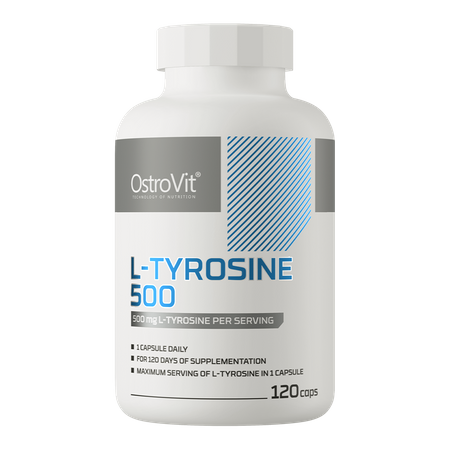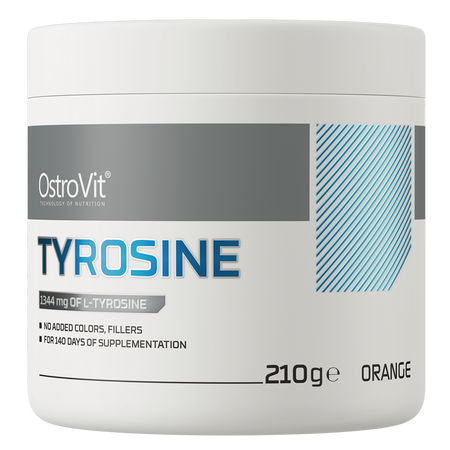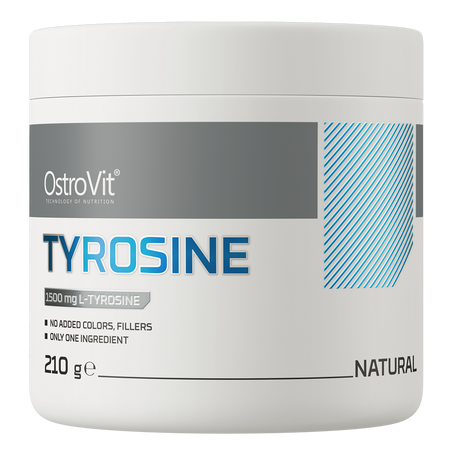Tyrosine
Tyrosine is an endogenous amino acid, for the proper synthesis of which the presence of phenylalanine is also necessary.
Tyrosine can participate in the synthesis of dopamine, as well as adrenaline and norepinephrine. However, this is not all, because the amino acid can also be involved in the production of thyroid hormones and the natural pigment melanin. The organic compound can also be helpful in stressful situations, as well as in the process of weight reduction.
Tyrosine - what is it?
Tyrosine is an organic compound belonging to the group of endogenous amino acids, i.e. those that the human body can synthesize on its own. However, the presence of another amino acid phenylalanine is necessary for the formation of tyrosine in the body.
The conversion of phenylalanine to tyrosine occurs as a result of a chemical reaction involving an enzyme called phenylalanine hydroxylase.
An easily absorbed form of the amino acid is its levorotatory optical isomer, i.e. L-tyrosine.
Interestingly, tyrosine was discovered by a German chemist in 1846 in casein derived from cheese. The name of the amino acid is derived from the Greek word "tyros", which means cheese.
Sources of tyrosine in a diet
Food products that are worth including in the daily diet to provide the body with tyrosine such as:
- milk and dairy products (cheese, yoghurt),
- meat,
- fish,
- eggs,
- nuts,
- dry legume seeds,
- oats and wheat.
Properties and action of tyrosine
Tyrosine is of very high biological importance. It can play an important role in the synthesis of the neurotransmitter dopamine and further it can be converted to other catecholamines, such as norepinephrine and adrenaline. Thus, the amino acid can improve concentration and memory, motivation to act and reduce the effects of physical and mental fatigue after intense exercise.
Tyrosine can also build proteins necessary for the proper functioning of the nervous system, as well as improve well-being. It can also support the body's work in stressful situations and reduce blood pressure during their duration.
In addition, it can participate in the synthesis of triiodothyronine and thyroxine, i.e. thyroid hormones, and thus may affect its proper functioning. It is also worth paying attention to tyrosine kinase, i.e. an enzyme that determines the transformation of tyrosine into its derivatives. In case of malfunction of this enzyme, there may be a decrease in the concentration of thyroid hormones and thus the development of hypothyroidism or Hashiomoto's disease.
L-tyrosine may also participate in the production of collagen and the synthesis of melanin - a natural dye that protects body against the harmful effects of UV radiation and is also responsible for the color of the skin and hair.
The amino acid can also affect metabolism, reduce appetite and monitor the amount of lipids in fat reserves.
Tyrosine may also indirectly affect the improvement of sports performance, due to its participation in the synthesis of dopamine and norepinephrine, the increased level of which may be associated with a feeling of arousal and motivation to act.
Tyrosine deficiency in the body
Tyrosine deficiency in the body may result, i.a. from the use of restrictive slimming diets, as well as undertaking intense physical efforts. Insufficient supply of the amino acid may contribute to the occurence of symptoms such as:
- problems with focus and memory,
- thyroid disorders,
- disorders of the nervous system,
- deterioration of mood,
- fatigue and weakness.
Excess tyrosine in the body
Excess tyrosine in the body is a very rare phenomenon. It is unlikely to exceed the demand for this amino acid by supplying tyrosine to the body only with food. When taking dietary supplements rich in this ingredient, it is easier to overdose. You may experience symptoms such as:
- increased feeling of anxiety,
- sleep problems and insomnia,
- hormonal disorders,
- nervousness.
Excess tyrosine, however, is most often associated with the natural tendencies of the body, especially among people with impairment of one of the metabolic pathways of this amino acid. This abnormality accompanies a genetic disease called tyrosinemia.
It is caused by enzyme deficiency and prevents the conversion of tyrosine. Thus, it can lead to the accumulation of toxic metabolites that may promote liver and kidney damage.
The disease may manifest itself in the first months of the child's life, i.a. jaundice, coagulation disorders or ascites and enlargement of the liver.
Is it worth supplementing tyrosine?
There is no need to take dietary supplements rich in tyrosine if we cover the demand for this amino acid along with the daily menu.
Preparations rich in tyrosine should be included in your diet when it is not possible to cover the daily demand for this ingredient, e.g. during intense physical or mental effort, and during exposure to long-term stress. Tyrosine supplementation should also be considered by people with excessive body weight or suffering from hypothyroidism.
Contraindications and side effects of tyrosine supplementation
Tyrosine is considered a safe dietary supplement that does not contribute to the occurrence of side effects. Taking larger portions of the preparation than recommended may contribute to the intensification of anxiety or sleep problems.
The use of tyrosine is not recommended among people taking MAO inhibitors, as well as among people suffering from migraines or hyperthyroidism and Grawes' disease.



